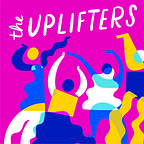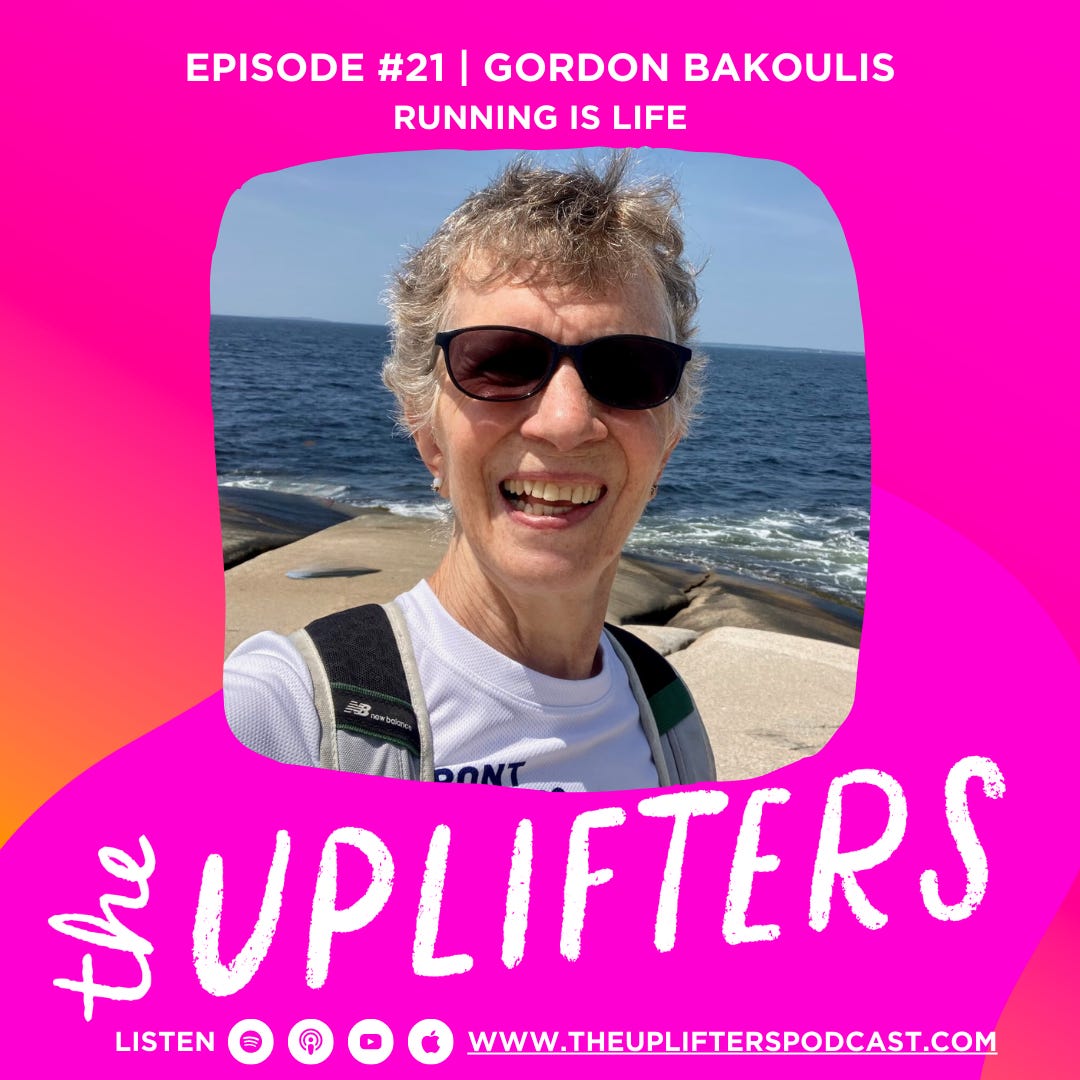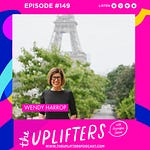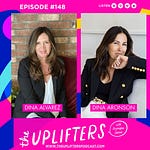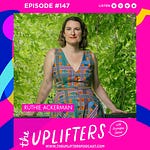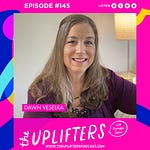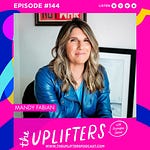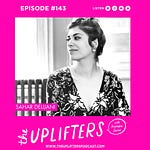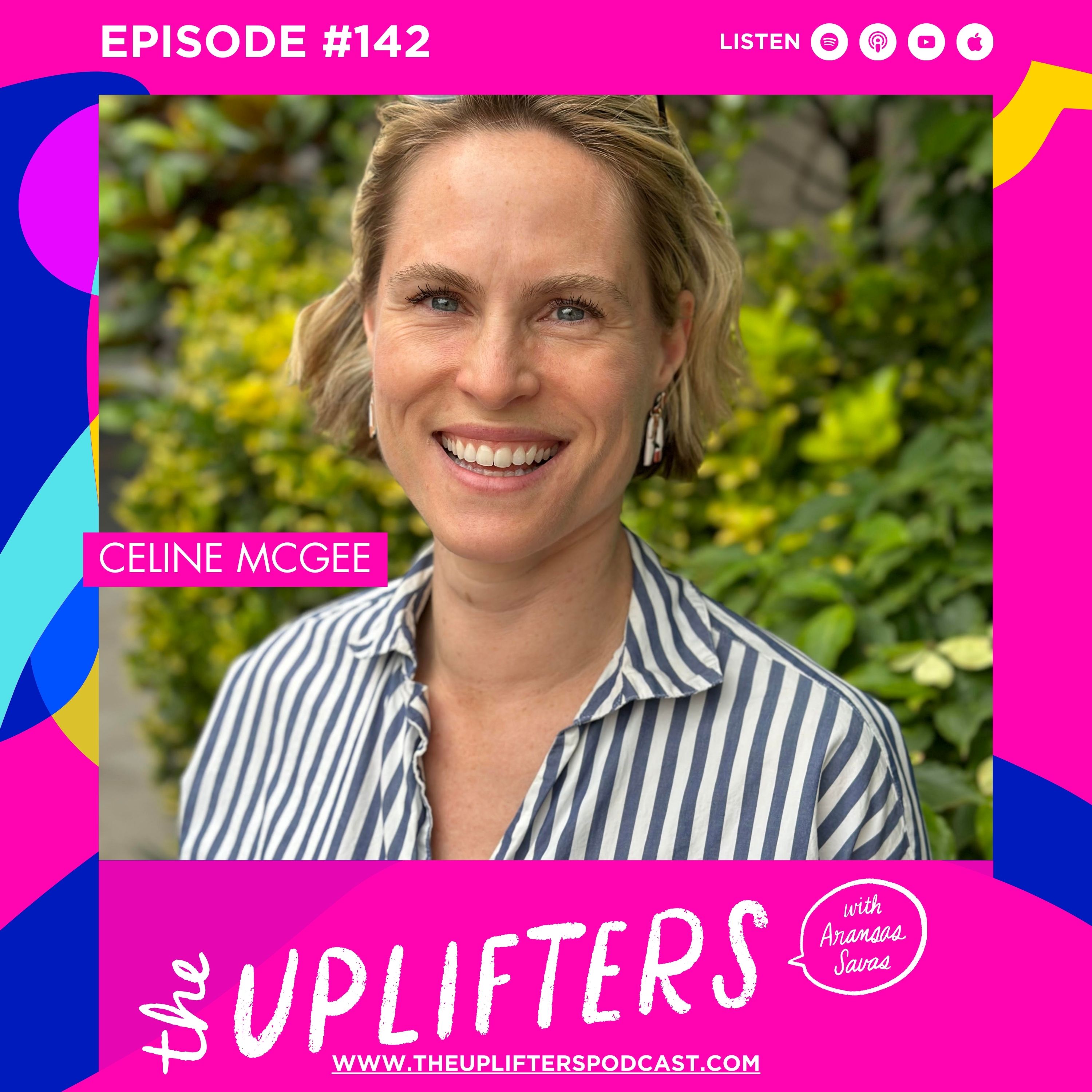“Don't race too often, don't go out too fast, and when you feel niggles, deal with them before they become injuries.” Gordon Bakoulis
THIS WEEK ON THE UPLIFTERS
Gordon Bakoulis, Editorial Director of New York Road Runners, qualified for the U.S. Olympic marathon trials in 1988, 1992, 1996, 2000, and 2004 and was a finalist in the 1992 U.S. Olympic 10,000m trials. She has represented the U.S. internationally at the 10K, half-marathon, and marathon distances.
When she started running in the mid-1970’s, there were very few women who could keep up with her pace, and even fewer whom she could look up to, but her pure love for the sport, the running community, and the success she discovered, lifted her up (even if the crude sports bras didn’t).
At age 62, Gordon's focus as a runner has shifted to health and longevity; however, she still loves chasing fast age-graded times and going head-to-head with her rivals. She coaches other women to find the joy and freedom of running and is a fierce advocate for access and equity in running.
In this episode you’ll learn:
[00:29:00] How to find peace and strength in the inevitability of aging and injury
[00:33:00] How to tune in to what ignites your passion
[00:35:00] How to understand your personal impact
[00:47:00] How to recognize what is inside you that is holding you back
MESSY TRANSCRIPT
Aransas: [00:00:00] Welcome to the Uplifters Podcast. I'm your host, Aransas Savas, and today I'm joined by Gordon Bakoulis. And Gordon has been a distance runner since 1978 She qualified for the US Olympic Marathon trials in 1988, 1992, 1996, 2000 and 2004. I mean, so start doing that math now, uh, to see how long her career has been. And she was a finalist at the 1992 US Olympic 10,000 meter trials. She's represented the US internationally at the 10 K distance, half marathon and marathon at 62, she is [00:01:00] still turning out crazy fast times, but.
That's not really even the most impressive thing about Gordon. The most impressive thing about Gordon is that I've had the opportunity now to talk to a number of people who have worked with Gordon, both in her day job as a New York Road runners editorial director and as a coach. Without fail, every person has described her in the same way.
This remarkable, talented, gifted woman is described over and over again as the kindest and most generous person they've ever known. And so today I am gonna. Chat with Gordon to understand both what it was like to be a pioneer. I'm pretty sure she doesn't even think of herself that way, but to be a pioneer [00:02:00] in women's distance running and how she has now translated that to bring the joy of running to well, directly and indirectly, probably millions of lives.
Gordon, thank you for being here and thank you for being you.
Gordan: Aransas, thank you so much. I'm really, really honored to be on the uplifters podcast. And, um, really excited to talk to you and see you again. And thank you for that introduction. Um, I, I feel humbled and, and overwhelmed, so thank you so much.
This is, this is gonna be a lot of fun.
Aransas: Well, I am, I'm a little energized too by getting to chat with you and you're just someone I've always admired and respected, and I think those are very different things, but, uh, in your case, both are very true and I just have always wanted to know more about this story.
So can we start [00:03:00] at the beginning of you falling in love with running? Yeah. When and how did that
Gordan: happen? Let's rewind, let's go all the way back. Um, as you said in your intro, I am 62 years old. Uh, so let's do a little math. I was born in 1961 and um, I was an active kid back then. Uh, active little girls were called tomboy, so I was a tomboy.
Um, I. Um, not necessarily organized sports 'cause as you said, or as you implied there, there were not a whole lot of opportunities for organized sports in, uh, any realm for, for little girls back in the sixties and early seventies. Um, it's funny how, you know, you just sort of, as a kid, you, your universe, you just accept it, you know, it's like, I was aware that little league was only for boys.
So I just grew up playing, you know, like sandlot baseball, um, and kickball and um, things like that. But then also, Games like kick the Can and hide and seek and we, we invented a game in our neighborhood that was my favorite. It was just called Chase. And it was just that we, sometimes we'd play it in teams, sometimes it would be like one individual and we would just, it was like organized, running around.
So we would just literally run around the [00:05:00] neighborhood all day long, um, playing, you know, organized and sometimes disorganized games, and I just loved that feeling, I did not get involved in running in an organized way till the very end of high school. I went out for track and immediately I, I discovered I did have a talent for running. Um, and went all the way to the state, meet in the. Um, I mean, I was not like, you know, I didn't go beyond that at all. You know, I, in the state meet, I, I don't remember how I placed, but it wasn't, you know, I wasn't a contender or anything, but that was, that was cool, you know, to, you know, 'cause I was recognized for that, um, at my high school and, um, uh, in like local, you know, the local paper and things like that.
So that was, that was kind of fun. But yeah, as you said, that was 1978. Um, 79. I graduated from co, from high school in 1979. And, um, you know, there, there were not a lot of runners in general. Um, and there were even fewer [00:09:00] girls and women running. Um, not a lot of role models to look up to, but there were a few, um, yeah.
Don't think of myself as a pioneer so much as like, just like right behind the pioneers, it was like they kicked the doors open and I ran through, ran, and I really felt like that, you know, like, so the names that I had heard of, um, in those days were Greta Waitz. Of course the great Greta Waitz who ended up, um, winning nine New York City Marathon titles, five New York mini titles.
Um, she was someone who was on my radar, um, even though she wasn't an American, she was Norwegian, you know, she was like a superstar. And I, I'd heard of her and then, Along the way, I, I knew the name Joan Benoit, who became Joan Benoit Samuelsson and went on to win an Olympic gold medal in the marathon in 1984.
Um, but very few others. Um, and, you know, I was the best at my high school, [00:10:00] so there was, you know, no one to really sort of chase on the local scene. Um, but yeah, you know, looking back, I guess, I guess I was pioneering, you know, the women, my, the girls and women my age. Um,
Aransas: certainly locally. Yeah. And who was championing you and encouraging you to keep
Gordan: going?
Yeah, that was interesting. Um, my parents didn't quite know what to make of it, but, uh, I'm sure as I, as I developed as a runner, my father, um, was also getting into running. He had, um, Uh, he had run the, he ran the New York City Marathon in 1978, 1979 and 1980, and he got into running as he recovered from alcohol addiction.
He had been an alco active alcoholic through most of my childhood and became sober in 1975 and, um, started running in the winter of 1976. So he was a [00:11:00] little bit, you know, I, I can't really say that he was my role model, but. I was aware that he was a runner and he was using it in a very different way than I was.
He was, you know, um, probably could have been, uh, talented and accomplished if he'd started younger, but really was using it, um, for recovery and, um, to get through those, those early months of sobriety. But yeah, and he revealed later that, that his father had been, um, a track runner, track and cross country runner back in like the 1920s, um, as a a, a college student.
So there is running in the family on that side. My mom was, um, she was a, she had been a tomboy as well as he comes, but, um, was not, was not a runner during the. Wow. Um, but yeah, they were, they were encouraging, you know, they, you know, certainly never stood in my way or said, you know, don't do that. That's, that's, you know, not feminine or, you know, [00:12:00] and, and I knew girls whose, whose mothers did tell them that.
Mm-hmm. Um, unfortunately, you know, that running was, um, you know, there were crazy misconceptions back then about your uterus falling out, you know, and that just sounds so silly now, but it was actually talked about as if it were a real thing. So there were girls who either were told they shouldn't run or couldn't run, or, um, and also the equipment was dreadful.
His shoes were horrible. You know, there were no decent running bras. And, um, you know, the shorts, everything was built for men. Bodies like skinny men. And, um, so a lot of women, um, really struggled with that. I had a skinny body just sort of naturally, so it wasn't that big a deal for me. But, um, that was, that was a, a huge barrier to, to some girls and women back then.
Aransas: And did you ever feel a sense of societal resistance or, um, discouragement? To keep going or, or were you just so talented that [00:13:00] people were like, this is
Gordan: awesome? Yeah, it was more than that. I don't get it, but keep going. Yeah, right. Exactly. Yeah. Like, you know, I don't understand it completely, but yeah, just do your thing.
And, you know, it was really this feeling of like riding a wave. Um, because the, the doors had been kicked open, um, the barriers were falling and more and more people were running, um, throughout the seventies, you know, 1972 was. Frank Shorter, winning a gold medal at the Munich Olympics and that that really, you know, kicked off the running boom in this country in a lot of ways.
Um, looking back, it was still a very, um, Insular. And honestly, there were a lot of barriers to inclusion. Um, it was perceived as something for skinny white people. Mm-hmm. And preferably fast, skinny, white people. Um, and that produced a lot of talent. I mean, American men and to a lesser extent women, but not women weren't, you know, completely excluded.
And we were being. Included more and more. Um, there was a ton of talent. [00:14:00] Um, you know, the talent pool was, was deep and there was just such a, an interest in it, but there wasn't a whole lot of interest in, in making the, the sport inclusive. Mm-hmm. Of all races, of all genders, of all body types. You know, the, the concept of, of fitness running was catching on, but it caught on first.
Probably among the people who needed it the least. If you, if you understand, you know, it really wasn't seen as something with people that people with disabilities could pursue. Uh, um, you know, as I said that, uh, people, you know, of all of all genders and ethnicities, I don't think there was out and out discrimination just so much as there was lack of access and lack of understanding.
Um, still very much a lack, a support for it. Lack of support. Yeah. I
Aransas: mean, the proverbial sports bra continues across all of these. Yeah.
Gordan: I mean, literal support was missing for women. Um, and, you know, there was still a, you know, completely [00:15:00] misguided sense of. You know, white people are more naturally gifted as distance runners and black people are more natural.
I mean, this is like, sounds sprinters ludicrous to try to explain it now because it's completely not grounded in science and you know, it's completely based on racist tropes and assumptions. Mm-hmm. That are, you know, just. Abre, you know, it's hard to even say these things now, even though I, you know, I never bought into them.
Um, that unfortunately that's, that's.
Aransas: Yes. And especially I feel like just over the last couple of years mm-hmm. There's been a louder, a louder expression of it, more open conversation about it, and therefore a greater understanding and hopefully some, it's like I'm, I'm still picturing. Joani ripping the doors open. Yeah. And you choosing to go through them.
To go through them. [00:16:00] Because having that choice, I'm sure a lot of people who didn't choose to go through them. Mm-hmm. But you couldn't have until the doors were open. Right? Right, exactly. And I think there's been an opening of the doors and now it's people. Trying to get through those doors. Mm-hmm. But it is, there's still a lot of disparity in terms of access Yeah.
Gordan: And support. Yeah. I mean, there's a story that, that Joan, um, Benoit Samuelson tells of, you know, when she first started running and she's four or five years older than I am, you know, not that much older. Mm-hmm. Um, that she would, you know, be running along a little road in rural Maine. And you know, when a car came by, she would.
Stop and pretend that she was picking flowers or picking up trash or something like that. Like she, you know, it was okay to be out there in wearing shorts or whatever, but not running as, as a high schooler, you know, young, young adult, young girl. And that's, that's something I never experienced. Um, I, again, I didn't experience discrimination, but looking back, I'm able to see, um, how, how, [00:17:00] you know, there were many, many more boys and men who ran than, than girls and women, you know, by a factor of 10 or 20 fold.
Um, and that's just the way it was. But again, nobody ever told me. You're a girl, you shouldn't run ever. You know, I just did not hear that. I was, it was encouragement, um, especially once my, my talent became, became evident.
Aransas: And what does that ratio look like now, Gordon?
Gordan: Oh, it's, there's, I mean, in road racing, um, you know, recreational racing, women outnumber female females out.
Uh, women outnumber men in, in road racing. Um, and it's, I think like 60%, uh, these are figures from, um, running u s A, you know, who keeps track of, of the road racing industry. You know, 60% of finishers overall at all distances are, are female. Identify as female, female, um, in the marathon. I think it's still slightly skewed toward, toward, uh, runners who identify as, as male rather than than female.
But [00:18:00] it's, it's approaching 50 50. Um, I don't know the figures for like scholastic, but you know, I, I would venture to guess. I think it's pretty safe to say that it's, it's. If not equal numbers of girls and boys in high school, um, are, are involved in running. And that wasn't the case when, when I was in high school, in college.
That's really
Aransas: encouraging for the other doors that are being opened.
Gordan: Yeah. Yeah.
Aransas: We hope so. And I think you're, you and others are opening another door that we haven't even talked about, which is running competitively. A, uh, I like don't even know where to draw the line. Mm-hmm. As masters, right? Mm-hmm.
Wherever that happens, we'll say that. Yeah. I was gonna say post menopause. I was gonna say no, no, no. All
Gordan: of the above all. Yeah. So none of those are, none of those are wrong. Yes. Yes. That's very, very exciting and that, I mean, we owe so much credit to, [00:19:00] um, you know, I, I've worked at New York Roadrunners for over 20 years and we, we really, not single-handedly, but you know, New York Roadrunners was played a huge role in that.
And specifically, um, our founder, our president, Ted Corbett. Um, just really believed in running, being a lifetime sport. Um, and, you know, not just paying lip service to that, you know, not just saying, yeah, of course, you know, you can run for your whole life. You know, setting up structures that allowed, um, and encouraged people of all ages to compete against their peers.
So, you know, age group awards, you know, that was not a thing at all until cor.
Gradually fade away after not even 40, you know, 35 was considered like, what are you still doing out here? You know, you're, you're not gonna, you know, it was sort of like, if you're not gonna get any faster, what's the point? You know, and that was, that just increased the insularity and the, you know, sort of [00:20:00] elite nature even of.
You know, so-called recreational running. And that was unfortunate, you know, because running can do, I mean, I could go on all day about the, the, you know, the benefits of running and why everyone should run, but you know, certainly, uh, yeah, getting faster, setting lifetime prs, that's very PRS is personal records, you know, the best.
The fastest you've ever run for a particular distance, um, is that's exciting. And when runners are, you know, getting started and every race is faster than the one before, that's, that's a very heady period. But for anybody that does not last forever, and you know, if that's your only motivation, um, eventually you're going to become frustrated and disappointed.
So why not set up a system where you're, you can continue to compete if that's, You choose to do and do so against your peers, your age, age graded peers, um, and, you know, have, have excitement around, um, you know, uh, competing with people [00:21:00] in, in your age bracket. And now there's a whole system of age graded.
Um, Uh, results, you know, you get a certain percentage or a percentile, um, if you achieve a certain, a certain time. So I'm, that's what keeps me motivated. Aransas: Um, what do you attribute your longevity?[00:22:00]
As your, the speed, the longevity of your speed. Mm-hmm. Mm-hmm.
Gordan: I, I had some really, I had a, a coach who was very, very good early on. Um, when I did get involved in adult running here in, in New York City, there was a women's team called Atlan, I was recruited to, to join it after I had some good performances at the mini and other races.
And, um, [00:23:00] yeah, Bob was, you know, a really sensible coach. he said, you know, don't race too often, um, within your races and workouts don't go out too fast. Um, you know, if you feel niggles, you know, Deal with 'em before they become injuries. So I, you know, I, I really internalized all that. I
Aransas: expect it's also because you have a natural tendency to see the positive you, you seem to be an optimist by nature.
I am,
Gordan: but a realist as well. You know, I'm not, I mean, yeah, we all go through a stage of denial when we, when we know we're injured, you know? It's like, no, I'm not injured. It's, Just, I'm just tired. I'm just this, I'm just, that denial is definitely one of the, the stages that injured runners go through.
I had, uh, really bad plantar fasciitis in both feet for about a year. Um, and yeah, I just, I just learned that you injuries do heal, you know? Mm-hmm. Once you've gotten through the denial, you go through the stage of like, that's it. You know, my career is over, I'll never run again. Um, but that's not true.
You know? Injuries heal, the body heals, you know, we've, we've been dealing with, you know, we, we evolved as running. Um, creatures. Um, you know, and, you know, nobody ever died of plantar fasciitis, I, I'm smiling because I've just been, I'm, you can relate about plantar
Gordan: fasciitis. Oh, we've all [00:28:00] been there. Yeah. It was
Aransas: my longest injury ever, and it was my longest break. And the. Best thing that ever happened to my body in some ways.
Gordan: Oh, that's good too. That's true. That, that happens. You, you redefine, you stop fighting yourself.
Yeah. At a certain point. Yeah. You know, you, you just make peace with your body and you, uh, I, I'm not trying to interpret your situation, but I found that I learned to love myself anyway. It's like I have an injured body, but I still love my body and I love myself. Yeah, it was, it was,
Aransas: was that your experience was hard?
Yeah, it was really hard at first, of course, and I couldn't run, and I tried and I'd push it and I'd aggravate it, and I'd push it and I, right. And so I didn't have the, I didn't have other options for myself. Mm-hmm. I finally realized that I had put all of my endorphin eggs in one basket. Yeah. And so I finally set up a system of support to learn how to really [00:29:00] lift weights.
Mm. That's great. It was like a whole new world opening up. Yeah. Because I was able to discover all these different things my body could do, and so now I'm finally easing back into running with so much more joy, so much more strength, so much more agility, and I just feel like. Whoa, that had I not gotten the plantar fasciitis, I would never have left running.
I would've just kept going. Yeah. And kept trying. But this forced me into a new path that really strengthened the whole foundation. So it That's awesome. So many challenges led to something far greater.
Gordan: Yeah. Oh, that's a really inspiring story. Aransas: Thank you. So you had to have had some moments. Mm-hmm. I just imagine a frustration along the career that you've had. Mm-hmm. [00:30:00] I mean, you talk about it's been over 30 years since you were turning in your lifetime prs. Yeah. How did you manage those moments where you're like, oh.
I'm not getting faster any longer. Mm-hmm. How did you sort of shift that in your mind to focus on what was possible in the next generation or the next Yeah. Chapter of your journey?
Gordan: Yeah, that's a great question. I mean, there's, there's several parts to that answer. Um, one is because by the time that period of my life came along, we're talking, we were in the early nineties, um, there was a.
Big supportive women's elite running community. You know, there was a real critical mass of people. And again, those pioneers that I spoke of earlier, um, particularly Greta Weiss and Joan Benoit Samuelson, I could look to them, um, and many others. Um, and see that they were slowing down too. So, you know, even though they were slowing down from, you know, a higher level than I was, I was, you know, not that far behind them. And I could see, okay, they're managing this with, with grace, with, um, and, and they're finding other ways to fulfill themselves.
So it was, it was. It was that having others that I could look to and say, yeah, it's happening to them. This isn't something that the universe is singling me out for, you know, to abuse, you know, by saying, haha, you're never gonna run fast again. Or You're never gonna be as fast in the future as you were in the past.
Um, I could see it happening and to men as well, you know, it's a universal thing. It's not, it's not unique to, to women runners. Um, so, you know, I, I felt like this is, this is what happens and you can still get after it. Um, and, [00:32:00] and so that was the second thing, that there were still many, many competitive opportunities, um, and I was able to take advantage of them.
I always enjoyed the recognition and I appreciated itbut, you know, it was, it was really sort of secondary to the feeling that I wanted in myself of, okay, I'm out there just trying my best and, you know, like blowing the cobwebs out every time I, I crossed, you know, uh, crossed a starting line and crossed a finish line.
So I was able to accept it. And then also I had gotten into coaching by that point I started dabbling with coaching in, um,
So much fulfillment from, um, coaching both individuals and, and groups and just seeing people at all different fitness levels, all different stages of their own running journey and with running, playing a different role, um, in, in their lives. You know, everyone has their own story of how running has, has impacted their life.
Um, and I just found the, that those interactions and those stories and, um, the challenge and pleasure of helping people on their journey, um, really, really engaging. So I was able to, to put more energy into that. Over the years,
Aransas: it seems like there's a really powerful three step process in there. Mm-hmm.
Which is normalizing the shift in the transition by [00:35:00] mm-hmm. By seeing how it happens in others. Tuning into what genuinely ignites you about this process that is not sort of the external validation and reward, but that inner fire of clearing the cobwebs and the feeling that comes with running and, and paying attention to that, and then turning your attention to others.
Mm-hmm. And to using your own experience to. Have impact. Mm-hmm. And when I talk to Uplifters, and at this point, uh, and I've shared this in other episodes, I've, I've surveyed thousands of uplifters about what it means to live up. And it always boils down to those three things. It says, be well, we connect deeply, we leave a positive impact.
And I hear so much of that really in, in your process for coming to a place of acceptance for this very [00:36:00] natural. Progression in your journey. Mm-hmm. Mm-hmm. And I think so, so often where we get stuck is we, we hold onto what was to the feeling of, well, in the past it looked like and felt like this. Oh yeah.
So much.
Gordan: Yeah.
Aransas: And no thank you. You really ease through to ah, this is what's here for me now. Right.
Gordan: Yeah. It's funny. Thank you so much for articulating that. 'cause I, I never. Articulated it until this moment as a, a three step process, but it, it really is. Um, and it's just sort of a marvel to me to look back on my relationship with running over the years, um, and feel how different it is now from 40 years ago, you know, when I was first getting started and, um, To, you know, I just feel like I was, I was so selfish.
I was so, you know, I mean, and, and part of that is just [00:37:00] aging. You know, you, uh, you know, during this time I also had children and, you know, I lost my parents. And you just see that life is bigger than, you know, whether you break 33 minutes in the 10 k, you so much bigger than that. Um, Yeah, your, your whole perspective just, just broadens and deepens.
But Yeah. You know, and, and, and so yeah, there is, there is an arc to it and there is a process to it, even if I didn't fully realize that at, at the time. Um, and in many ways I'm, I'm happier now as a runner. I'm so much slower, but much, much more in tune. I'm in tune with my body. I'm in tune with my psyche.
And just that, that sharing and giving back, um, is, is more fulfilling than I ever could have imagined. You know, I could not have imagined any of that when I, when I first stepped into running at all and [00:38:00] then stepped into competitive running. But here, here we are. Here we are.
Aransas: Yeah. It's, and I know now it's miraculous.
You are focused on coaching mostly women over 40. I am. Yeah. How do you. Guide them. Yeah. What do they, what do they most need from you?
Gordan: Uh, well, how, how I guide them is, um, any runner, you know, but, but especially women, 40 and over. I feel like we, we just need to listen to each other. Um, so it's just, yeah, listening without judgment. Um, And yeah, just, you know, being, being a support. Um, a lot of people at all levels need to be told what not to do. You know, it's like, mm-hmm. You just ran a really hard race. Do not go out and do another workout the next day. Oh, but I feel so great. We're like, no, no, no, no, no.
Just rest. You know, take a walk, do some yoga, maybe, you know, go for a swim, but don't go out and do a hard workout. And that's, that's again, as I said, at at all levels. You know, certainly the, the best runners in the world are known for, you know, they, their coaches just say, my job with this person is to make sure they don't literally run themselves into the ground.
Yeah. I was once told that the best way to find the right therapist is to find the one who can really listen to you. Mm-hmm. [00:42:00] And I think that's true for all of the people who, who we hire. I think so to support us. Mm-hmm. So to find the coach, the trainer, the therapist, the doctor who you feel can hear you.
Yeah. 'cause not everyone is able to do that. Some people are so, um, focused on their expertise or their assumptions that they can't really hear you. And I think what you're describing is just such a. It's the essence of you, and it's why people describe you as being so kind and generous. Mm-hmm. You've shown them that through listening and hearing.
Gordan: Yeah. Yeah, I think that that's true what you, what you say. I also think that sometimes as a coach or you know, an expert in any field, we think that what people are looking for is expertise. And they are, you know, [00:43:00] you wouldn't want someone to perform heart surgery on you that wasn't an expert heart surgeon.
Um, you know, and you know, In a sort of different realm, you wouldn't want someone to coach you to run a fast marathon who had never had success in the marathon. Um, but coaches can't fix everything. Um, and, and also I. It's, it has to be within the runner. You know, the runner has to have the, the desire, the motivation, um, and the ability to, to achieve what, what they are dreaming of.
Um, and so the, the coach is, is a facilitator of that. Um, but the coach, even the most expert coach in the world, can't solve every problem that the runner is going to encounter along the way. I think this idea [00:45:00] of coaching with acceptance mm-hmm.
Is something that cultivates acceptance in the athlete or the person being coached. And I think so too. To me, that is my observation about racing. Having been at this for 20 years and spent a lot of time with a lot of runners, there are a lot of people who train really well. Mm-hmm. And they are so fast and so free in training, and then they get to race day and consistently don't turn out.
Races mm-hmm. That are aligned with their training. And my belief is that in racing people, Get into a sense of fear. And I've certainly experienced fear in races. Mm-hmm. And we start to think about all the things that could go wrong. Mm-hmm. And I remember very vividly, the marathon I trained for with you, there was a train track that crossed the course.
I remember that I [00:46:00] became obsessed with the possibility of this train crossing my path. Yeah. And so it was, it was mentally, It was draining, but physically it was draining because I was releasing all these fear hormones mm-hmm. Into my body. And there's nothing that creates exhaustion faster. Right. And so for me, the, when things really turned around, it was when I.
Decided to run with just full joy and acceptance of what is. Mm-hmm. That's great. And the second I started to do that's racing became so pleasurable and I raced way faster than I trained. Right. Which is what we want. Right. That's, that's a good
Gordan: story because that was, that was inside you all along that ability to do that.
I was holding me back. Yeah. You were holding yourself back. Yeah, because, yeah, it, and, and even as you say physically, because you know, on race day, it's like, oh, I wanna speed up, so I, you know, beat the train. Catch up. [00:47:00] Yes. Yeah, yeah, yeah. No, it's hard. It's hard. I get into my whole, you know, marathons are like life, because it's hard not to live your life in fear sometimes, you know, because there's so many things can go wrong, but, um, yeah, if you just try to live as joyfully as you can, um, you know, and, and in, in expectation that, that, um, you know, things are gonna happen.
Yes, things are absolutely gonna happen, and, and you're wrong. Have. Messed up your race, but would you have had the ability, any control to, to no control? No. But you would've dealt with it, you know? Yes. You know, you would've just gotten to the train tracks, waited for the train to go by. Then continued on with your race.
Mm-hmm. And who knows, that's what would've
Aransas: happened. It could've helped. Yeah. Yeah. Right. It was certainly more helpful than [00:48:00] flooding my system with stress and
Gordan: fear. With stress. Yeah. Yeah. Yeah. So true. So, yeah, just, yeah, if I can, if I can impart that to people that, look, things are gonna go, are gonna happen on race day.
You've prepared for and things are gonna happen probably that you haven't prepared for. You know, you could fall, you could miss a water station, it, there could be a thunderstorm. Um, you could pee your pants. I mean, anything could happen. You know, things that, I mean, I think I've done all of those. I certainly have, but you'll deal with it.
You know, you'll, whatever happens. And that's true in life as well. You know, our kids could fail a test or not get into the right college or, you know, lose their job or whatever. Um, and light
Aransas: goes on. We'll deal with it. Yeah, you'll deal with it. You'll learn. Yeah. Yeah. What wisdom at Gordon? Um, As I said, I have asked a lot of folks, um, what it means to live up, and I wanted to ask you mm-hmm.
Those three [00:49:00] questions. What, what do you do in addition to running mm-hmm. To care for your wellbeing?
Gordan: Lots of things and, and more and more over time. I mean, that's again, another thing that my early days. In life and in running. I, I didn't do enough of, um, I just have always had incredible endurance and, you know, have just plowed through. Um, and I, I am more cognizant now that that's, That's always sustainable or healthy or the right thing to do.
So I build in relaxation. Um, I try just little things like I try to walk home every day, you know, as long as the weather's good, and really use that time to decompress. Um, To just kind of do nothing other than than walk. Um, sometimes I'll listen to a podcast yay, or music or something, but sometimes I'll just be and just be me [00:50:00] walking through Riverside Park.
Very, very lucky again that I live in a place where I can do this, where it's safe, you know where I feel. Um, you know, what we, what we take as nature in, I feel, you know, I, I have access to beautiful spaces, so I do that. Um, I nurture relationships, especially with my husband. Um, we've been married for 27 years and, you know, .
And the, my greatest source of, of support and, uh, and love and other relationships, how do I, how do, do. Stay connected. Um, my relationships with my siblings, um, and, and friendships. Um, I'm very blessed to have a group of, uh, friends I've known since high school and, um, as a pandemic gift.
We really, we all reconnected in the spring of 2020 and we've been doing a weekly Zoom call ever since. There's 10 of us, not all 10 of us get on the call every week, but it's, um, just, it's always there. You know, we, we, we stay connected through that and, um, really support each other. We laugh together, we dance, we, it's, it's incredible.
Um, there's that, um, and, and then running, you know, running is. Um, is a huge, you know, and then, you know, running that doesn't involve speed work or racing or coaching. Just, you know, running as, as therapy. Um, my faith is really important to me. So those are the main practices for me.
Aransas: What do you hope your legacy will be, Gordon?
Gordan: Oh.
I [00:53:00] really, I really want, what I want is everyone who chooses to, to be able to, um, realize the benefits of running whatever running means for them. Um, I, I see myself as a lifetime runner, but that doesn't mean that my running will always look like it looks today. Um, you know, putting on a singlet in shorts and running shoes and, um, Going out and moving, moving through space.
That's how it looks now. I'm still, you know, taking one foot off the ground at a time. But yeah, my running could evolve into something a lot slower, a lot less frequent. Um, and, you know, maybe more of a, a walk. What would look more like a walking practice? Um, yeah, I just wanna continue to create a world where everyone has that opportunity.
You know, regardless of skin color or um, body type or gender, gender expression. Um, and, you know, where everyone feels welcome. Um, [00:54:00] you know, it's, it's easy to say running is for everybody and runners have always said that, or, you know, I've always, I've, the running community that I've been a part of has always said that, but it's, it's a different thing to actually welcome, um, all different mm-hmm.
All different people into the running space. So I hope that's part of my legacy that I've, that I've made running as, as inclusive and accessible. As it can possibly be.
Aransas: Well, I know there is one and mm-hmm. I am one of the many, many, many beneficiaries of it. Thank you for your time today, and thank you even more so for all of you, all you have done for women runners, runners in second half of life, and people thank you.
Been such a great conversation. For all of you listening, thank you as well for all that you do from [00:56:00] this conversation. I hope you find some little reminder to take care of yourself as well as you take care of everyone else. I'll see you over@theuplifterspodcast.com, where you'll find more about Gordon, as well as lots of other Uplifters, along with research tips and ideas for living your best life.
Let's keep rising higher together.


